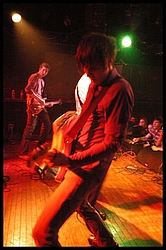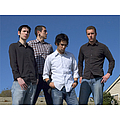Formed in Lancaster, Pennsylvania in 2001 while it's members were still in high school, Albert React showed, early on, an obvious knack for songwriting and melody that were often overlooked by their peers. After releasing a split CD with Sadaharu on CI Records in 2002, the band signed to Eulogy Records and released their debut full-length, Confluence & Scrapes. "Confluence" showed the band moving further along the path they had started upon, distancing themselves from the heavy aggressiveness of their earlier material, and maturing into a band more at home within the boundaries of melody. All Music Guide plainly stated "the song's chord progressions sprawl out in a sort of loose-limbed beauty and the melodies meander attractively", while PunkRocks.net boldly exclaimed, "Albert React has a way of seamlessly blending good songwriting and explosive energy." Following the release of Confluence & Scrapes, the band criss-crossed the country, supporting acts such as Dead Poetic and Calico System, and making an appearance at the renowned Hellfest. Having finished up their support cycle for the album in 2004, the band busily began writing material for its next release. Several line-up changes, and many months later, Albert React emerged from their cocoon with much of the material that would become "Sonos Aeterno". Whereas the band had previously been content in its exploration of melody, their new material embraced it exuberantly. "I feel like we've grown up a lot as a band, and as people," explains Libhart, "and I think that's very apparent in the sound of the record." Engineered and produced by Kevin Ratterman, best known as the drummer for influential indie-rockers Elliott, the album immediately sounds warm and inviting while at the same time, paradoxically, sounding cold and distant. Ratterman is no stranger to beautifully atmospheric mood rock, and it's all at once obvious that the pairing is perfect. Recorded in, quite literally, a funeral home in Louisville, one can't help but wonder if the album's swirling melodies and whispering guitar and keyboard lines are the sound of progress, or the sound of the dead offering final pieces of advice for the living. It remains philosophically debatable exactly what exactly is inferred by the notion of 'eternalizing sound'. On one hand, any music, once released into the public, and or pressed onto a small, firm, disc can be considered 'eternal' if it is embraced and remembered by those that have heard it. On the other hand, said eternalization of sound becomes something else entirely if those who wrote it know that they have created something that they can stand behind well into the future as being the exact composition that they sought to create in the first place. For Albert React, both of these scenarios hold true with "Sonos Aeterno". http://myspace.com/albertreact http://www.alberreact.com


















